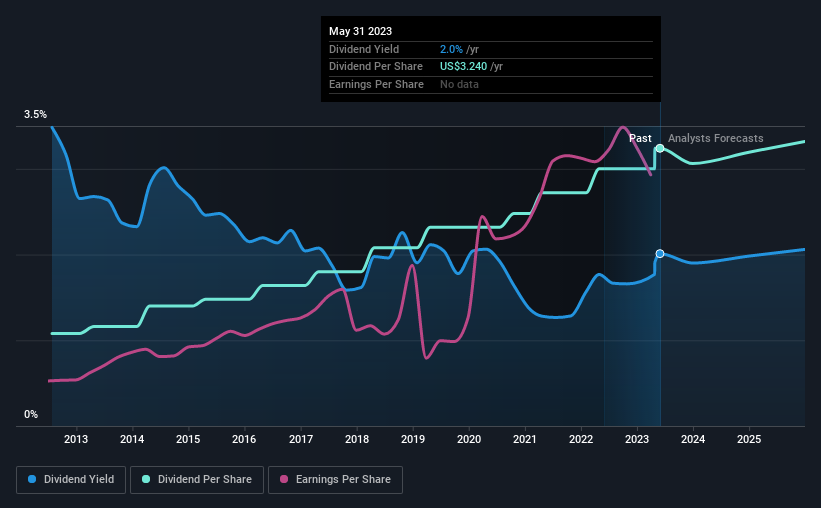Should You Buy Avery Dennison Corporation (NYSE:AVY) For Its Upcoming Dividend?
Readers hoping to buy Avery Dennison Corporation (NYSE:AVY) for its dividend will need to make their move shortly, as the stock is about to trade ex-dividend. The ex-dividend date occurs one day before the record date which is the day on which shareholders need to be on the company's books in order to receive a dividend. The ex-dividend date is an important date to be aware of as any purchase of the stock made on or after this date might mean a late settlement that doesn't show on the record date. Accordingly, Avery Dennison investors that purchase the stock on or after the 6th of June will not receive the dividend, which will be paid on the 21st of June.
The company's next dividend payment will be US$0.81 per share. Last year, in total, the company distributed US$3.00 to shareholders. Last year's total dividend payments show that Avery Dennison has a trailing yield of 2.0% on the current share price of $161.13. We love seeing companies pay a dividend, but it's also important to be sure that laying the golden eggs isn't going to kill our golden goose! So we need to investigate whether Avery Dennison can afford its dividend, and if the dividend could grow.
Check out our latest analysis for Avery Dennison
Dividends are usually paid out of company profits, so if a company pays out more than it earned then its dividend is usually at greater risk of being cut. That's why it's good to see Avery Dennison paying out a modest 36% of its earnings. Yet cash flows are even more important than profits for assessing a dividend, so we need to see if the company generated enough cash to pay its distribution. Fortunately, it paid out only 46% of its free cash flow in the past year.
It's positive to see that Avery Dennison's dividend is covered by both profits and cash flow, since this is generally a sign that the dividend is sustainable, and a lower payout ratio usually suggests a greater margin of safety before the dividend gets cut.
Click here to see the company's payout ratio, plus analyst estimates of its future dividends.
Have Earnings And Dividends Been Growing?
Stocks in companies that generate sustainable earnings growth often make the best dividend prospects, as it is easier to lift the dividend when earnings are rising. Investors love dividends, so if earnings fall and the dividend is reduced, expect a stock to be sold off heavily at the same time. It's encouraging to see Avery Dennison has grown its earnings rapidly, up 21% a year for the past five years. Avery Dennison is paying out less than half its earnings and cash flow, while simultaneously growing earnings per share at a rapid clip. Companies with growing earnings and low payout ratios are often the best long-term dividend stocks, as the company can both grow its earnings and increase the percentage of earnings that it pays out, essentially multiplying the dividend.
The main way most investors will assess a company's dividend prospects is by checking the historical rate of dividend growth. Since the start of our data, 10 years ago, Avery Dennison has lifted its dividend by approximately 12% a year on average. It's great to see earnings per share growing rapidly over several years, and dividends per share growing right along with it.
The Bottom Line
From a dividend perspective, should investors buy or avoid Avery Dennison? Avery Dennison has been growing earnings at a rapid rate, and has a conservatively low payout ratio, implying that it is reinvesting heavily in its business; a sterling combination. It's a promising combination that should mark this company worthy of closer attention.
On that note, you'll want to research what risks Avery Dennison is facing. To help with this, we've discovered 2 warning signs for Avery Dennison that you should be aware of before investing in their shares.
If you're in the market for strong dividend payers, we recommend checking our selection of top dividend stocks.
Have feedback on this article? Concerned about the content? Get in touch with us directly. Alternatively, email editorial-team (at) simplywallst.com.
This article by Simply Wall St is general in nature. We provide commentary based on historical data and analyst forecasts only using an unbiased methodology and our articles are not intended to be financial advice. It does not constitute a recommendation to buy or sell any stock, and does not take account of your objectives, or your financial situation. We aim to bring you long-term focused analysis driven by fundamental data. Note that our analysis may not factor in the latest price-sensitive company announcements or qualitative material. Simply Wall St has no position in any stocks mentioned.
Join A Paid User Research Session
You’ll receive a US$30 Amazon Gift card for 1 hour of your time while helping us build better investing tools for the individual investors like yourself. Sign up here

